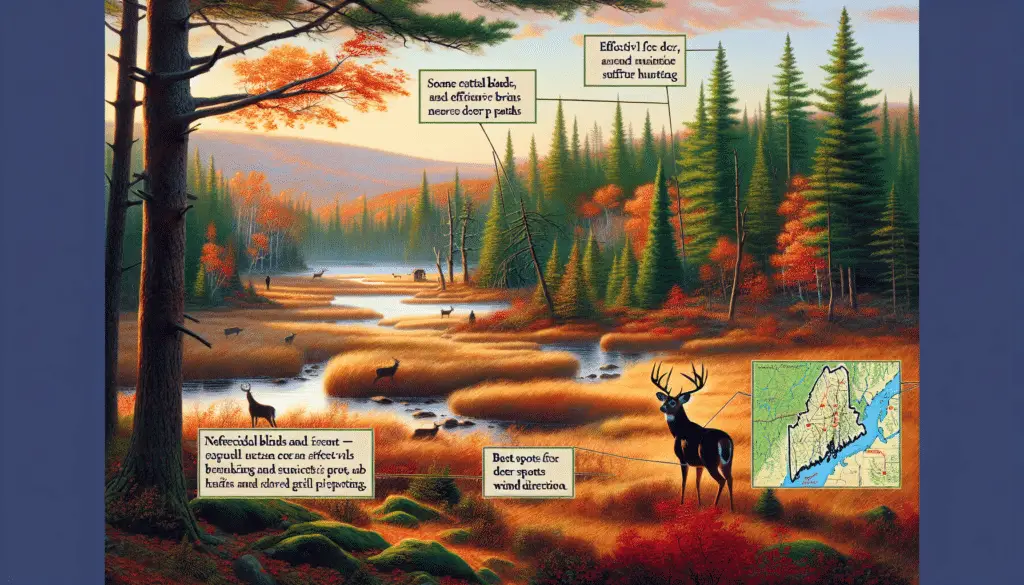Discover Maine’s Top Deer Hunting Spots
Table of Contents
ToggleMaine is renowned for its lush forests, sprawling wilderness, and abundant wildlife, making it an ideal destination for deer hunting.
You might be wondering where exactly you should set your sights for a successful outing.
One of the most popular regions is the North Maine Woods, offering over 3.5 million acres of commercial forestland.
In these dense forests, scouting ahead of your hunt is key.
Look for areas with fresh tracks, droppings, and signs of bedding to increase your chances of a successful hunt.
Hunting Techniques for the Maine Whitetail
The Maine whitetail deer is a clever species, necessitating smart hunting strategies.
Still hunting, where you move stealthily through the woods, can be quite effective.
Using proper camouflage to blend in with the natural environment is essential.
It’s also helpful to understand the behavior of deer during different seasons.
What Gear to Bring for Deer Hunting in Maine
Proper gear is crucial for a successful hunt, and this starts with selecting the right firearm.
In Maine, hunters commonly use rifles like the .30-06 Springfield for its reliability and power.
However, remember to check the latest regulations regarding permissible firearms for deer hunting.
Additionally, investing in good-quality, scent-blocking clothing can give you an edge by helping mask your human scent.
In-Depth Gear Review: The .30-06 Springfield Rifle
When it comes to choosing a rifle, the .30-06 Springfield often receives high praise from hunters.
Its accuracy and stopping power are frequently highlighted in product reviews.
Plus, its versatility is a big selling point—you can use a wide range of bullet weights for different types of game.
Pros
- Excellent stopping power
- Highly versatile for various game
- Good availability of ammunition
- Reputation for reliability
Cons
- Recoil may be strong for new shooters
- Not suitable for all hunting zones
Find This and More on Amazon
Understanding Maine’s Deer Behavior and Movements
Deer behavior can vary with the seasons, which impacts how you hunt.
In the fall, bucks are more active during the breeding season, making them easier to spot.
Spring and summer, on the other hand, see deer focusing on feeding, especially in early mornings and late evenings.
For insights into deer movements throughout the day, deer feeding times can be a great resource to plan your hunting trips.
Finding the Perfect Hunting Spot in Maine’s Vast Terrain
Given the expansive natural areas, finding the perfect spot might seem daunting, but Maine’s geography favors the hunter who does his homework.
Look to the western mountain regions where deer often travel along the ridges, providing a good opportunity for setting up a stand.
Alternatively, river valleys in central Maine provide plentiful food sources and cover for deer, making them good hunting areas.
If you’re unfamiliar with the terrain, consider consulting resources like topographical maps or even hiring a local guide.
Baiting and Attractants: Legality and Tips
Using bait or attractants in Maine requires knowledge of the current laws, as regulations can be strict.
Before planning your hunt, always check the latest updates on what is permissible.
If baiting is allowed, products like commercial deer attractant scents can be used to draw deer into your area.
Remember that these scents replicate the smell of food or does in estrus, so positioning them strategically is imperative.
For further details on how to attract deer to your hunting spot, you could benefit from reading about the best food plots for deer.
FAQs: Maine Deer Hunting
What hunting gear is recommended for Maine’s weather conditions?
The weather in Maine can be unpredictable, so layering is critical.
Waterproof and insulated boots will keep you comfortable in damp conditions, and a weather-resistant outer layer will protect you from wind and rain.
What is the best time of day for deer hunting in Maine?
Deer are most active during dawn and dusk.
These “golden hours” are when deer move from their bedding areas to feeding zones, making them ideal times for successful hunts.
Are there any restrictions on the type of firearm I can use for deer hunting in Maine?
Yes, Maine has specific regulations on firearms for hunting.
It is crucial to check the Maine Department of Inland Fisheries & Wildlife for the most current regulations before your hunt.
Strategies for Following and Tracking Maine Deer
Effective tracking is crucial for any successful hunting trip, especially in Maine where the deer are elusive.
Learning to read signs such as rubs on trees, which indicate the presence of bucks, can give you key insights into deer activity.
Moreover, tracking through snow can provide clear evidence of recent deer paths and help you predict their movements.
Don’t overlook local knowledge, either; engaging with the hunting community might provide you with the tips you need.
Securing a Successful Shot
Securing the kill shot is a moment of truth for deer hunters.
Aiming for the vital organs, specifically the heart and lungs, is generally the most humane and effective method.
Practicing your marksmanship beforehand will increase your confidence and precision when the moment arrives.
If you need tips on aiming, consider looking into where to shoot a deer to drop it in its tracks.
Utilizing Trail Cameras for Pre-Hunt Scouting
Trail cameras are a hunter’s best friend when it comes to scouting an area without physically being there.
Cameras like the Bushnell Trophy Cam HD provide high-quality images and videos, day or night.
Not only can cameras reveal the size and number of deer in an area, but they also detail their routines, leading to a more informed hunting strategy.
Pros
- High-resolution imaging
- Night vision capabilities
- Durable and weatherproof
- Long battery life
Cons
- Can be expensive
- Requires periodic visits to retrieve data
Find This and More on Amazon
Navigating Maine’s Legal Hunting Regulations
Navigating legal formalities is another important aspect of deer hunting in Maine.
Every hunter must possess a valid hunting license, and tags for the deer harvested.
Make it a point to familiarize yourself with the zone-specific regulations which can be found at the Maine Department of Inland Fisheries & Wildlife’s official site.
Also, keep in mind the laws regarding prohibited methods of hunting and the use of land without permission.
Timing Your Hunt to Maine’s Hunting Seasons
Timing can be everything when it comes to deer hunting in Maine.
The state typically schedules specific dates for residents and non-residents, archery, and firearms seasons.
To maximize your success, understanding these windows, often published by deer species, is crucial.
Ensure you’re up to date on these schedules, as they can also impact the deer’s behavior and movement patterns.
Preparing and Processing Your Deer Harvest
Once you’ve made your successful kill, proper field dressing and processing your deer is the next step.
Knowledge of how to swiftly and cleanly field dress a deer will affect the quality of the meat and minimize its gaminess.
For those not familiar with the process, how to field dress a deer can be an indispensable guide.
Local processors can take care of the butchering if you’re not doing it yourself, but learning the skills will serve you well in the long run.
Mitigating the ‘Gamey’ Taste in Venison
One challenge hunters often encounter is the ‘gamey’ taste often attributed to venison.
Careful handling of the meat, from field dressing to aging and proper cooking, can mitigate much of this distinct flavor.
Removing the silver skin and fat is one way, as they often hold most of the gamey taste.
Marinating the meat and choosing the right cooking methods, such as slow-cooking or grilling, also play a pivotal role.
Parting Tips for Aspiring and Veteran Maine Deer Hunters
Whether you’re new to deer hunting or a seasoned sportsman, there’s always something new to learn.
One tip is to keep a hunting journal to reflect on what strategies worked well and what could be improved upon for your next hunt.
Additionally, patience and persistence often pay off, as deer hunting is as much a mental game as a physical one.
Finally, don’t forget to enjoy the natural beauty that Maine has to offer while respecting the environment and local wildlife.



